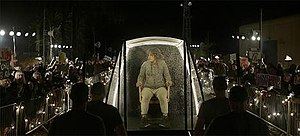| "White Bear" | |
|---|---|
| Black Mirror episode | |
 Victoria (Lenora Crichlow) is exposed to the angry crowd. This scene exemplifies an eagerness for "an eye for an eye" punishment existing in society.[1] One reviewer said it "attacks our current culture" trend of "dressing up the humiliation of others in the name of entertainment".[2] | |
| Episode no. | Series 2 Episode 2 |
| Directed by | Carl Tibbetts |
| Written by | Charlie Brooker |
| Original air date | 18 February 2013 |
| Running time | 42 minutes |
| Guest appearances | |
| |
"White Bear" is the second episode of the second series of the British science fiction anthology series Black Mirror. It was written by the series creator and showrunner Charlie Brooker and directed by Carl Tibbetts. The episode follows Victoria (Lenora Crichlow), a woman who does not remember who she is, and wakes up in a place where almost everybody is controlled by a television signal. Along with some of the few other unaffected people (Michael Smiley and Tuppence Middleton), she must stop the "White Bear" transmitter while surviving merciless pursuers.
Brooker originally wrote the episode in an apocalyptic setting, but when the script was about to be filmed at a former Royal Air Force base, he changed it because of a fence he saw there. He rewrote the story in two days, removing some details he considered useful for a sequel story. The main change was the addition of a plot twist at the end of the script, which was noted as the most impressive aspect of the episode by several reviewers.
The episode, first aired on Channel 4 on 18 February 2013, was watched by 1.2 million viewers and was very well received by critics, particularly for its writing and Middleton's performance. The story draws parallels with real murder cases, primarily the 1960s Moors murders, in which five children were killed. Its horror aspects have been said to be reminiscent of the 1970s film The Wicker Man and the video game Manhunt, while some similarities with The Twilight Zone have also been noted. This dystopian episode reflects upon several aspects of contemporary society, such as media coverage of murders, technology's effects on people's empathy, desensitisation, violence as entertainment, vigilantism, the concept of justice and punishment, and the nature of reality.